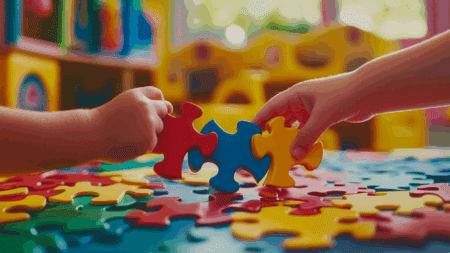What goals for your child in kindergarten should you focus on? This question comes up for many parents as their little one takes their first step into formal education.
The good news? You don’t need fancy programs or expensive materials. Simple, everyday activities and consistent support are the keys to helping your child meet important kindergarten goals.
This blog provides practical strategies for building social skills, early reading abilities, and basic math concepts that will help your child succeed.
From creating effective routines to setting achievable goals, we’ll show you exactly how to track progress and celebrate the small wins that lead to big growth.
Read on to learn how you can turn ordinary moments into powerful learning opportunities for your kindergarten child.
Goals for Your Child in Kindergarten
Kindergarten helps your child develop key skills for future success. Here are three important focus areas:
1. Social and Emotional Development
To help your child name and express emotions, start by teaching them the basic feelings like happy, sad, angry, or scared.
Use simple phrases such as “I feel upset when…” to help them talk about their emotions.
Reading books about feelings and creating a feelings chart with faces and names for each emotion can also support their understanding.
Practice sharing, waiting, and solving problems through daily play. Games that involve taking turns are a great way to build patience.
You can use a timer to help children know when it’s time to give someone else a turn.
Try role-playing little problems and walk through simple solutions together. Always praise them when they wait or share kindly.
To build confidence, let your child make small choices, like picking their outfit or choosing between snacks.
Encourage them to try tasks on their own, like putting on shoes or cleaning up toys. Celebrate their effort, not just the outcome, and remind them that mistakes are okay and help us learn.
2. Early Literacy Skills
To help children understand letters and their sounds, start by pointing out letters you see every day—on signs, food labels, or books.
Play games that focus on beginning sounds and try forming letters out of play-dough for a hands-on experience. Singing songs that repeat letter sounds also helps them remember.
For sight words, you can label common items around the house like “door,” “cup,” or “chair.” Make a simple word book filled with new words your child is learning.
Word games and spotting familiar words during reading time help build confidence and recognition.
When it comes to listening and retelling stories, read together daily. Ask your child what happened in the story and encourage them to tell it back in their own words.
Use the pictures in the book to guide their memory, or let them act out the story using toys. This builds understanding and storytelling skills.
3. Basic Math Concepts
To practice counting forward and backward, count everyday things like toys, snacks, or steps. Start from different numbers each time and make it fun by jumping or clapping with each count.
Use real-life moments like putting away blocks or passing out napkins to practice counting in a natural way.
For shape recognition, look around the house for circles, squares, triangles, and more. Sort items by color, size, or shape to help your child learn differences.
Try using items like string, sticks, or food to create different shapes, and play “find the shape” games around the room.
To teach addition and subtraction, use small objects like buttons or blocks to show how numbers come together or are taken away.
Ask simple math questions during play or mealtime, such as “If you have 3 grapes and I give you 2 more, how many do you have?”
Read books with counting stories, and play simple games that use numbers to help build math skills in a fun and engaging way.
Learning works best when it’s fun and part of everyday life, using just your time and attention.
Smart Goal Examples for Kindergarten Kids

Setting good goals helps kindergartners learn important skills. SMART goals are Specific, Measurable, Achievable, Relevant, and Time-bound.
Here are some examples that work well for young children.
Social Goal Example
“I will take turns during playtime every day for one week.”
This goal works well because it focuses on a clear action (taking turns). You can check if it happens each day. It’s something a 5-6-year-old can do.
It helps build friendship skills. The one-week timeframe is just right for a young child.
How to support this goal: Talk about what “taking turns” looks like. Practice at home with games or toys. Ask about turn-taking at the end of each day.
Use a simple chart with stickers to track progress. Celebrate after a full week of trying.
Academic Goal Example
“I will recognize all uppercase letters by the end of the month.”
This goal works well because it targets a specific skill (uppercase letter recognition). You can test this by showing flashcards. It builds on what the child already knows.
It connects to reading readiness. The monthly timeframe allows for steady progress.
How to support this goal: Break it down (learn 5-6 letters per week). Make it fun with games, not drills. Point out these letters in books and signs.
Use different ways to practice (tracing, finding, matching). Track progress on a chart that shows all 26 letters.
Self-Help Goal Example
“I will pack and unpack my school bag every morning.”
This goal works well because it names an exact task (packing/unpacking the bag). You can easily see if it’s done. It builds independence. It creates a helpful daily habit. It happens at a specific time (morning).
How to support this goal: Create a simple picture list of what goes in the bag. Set up a special spot for the school bag at home.
Give extra time in the morning routine for this task. Offer help at first, then step back more each day. Notice and comment when your child does this without reminders.
Setting small, clear goals helps kindergartners feel good about growing up and learning new things. Keep goals simple, make them fun, and celebrate when your child makes progress.
How Parents Can Help Kids Reach These Goals

Parents play a key role in helping kindergarteners meet their goals. Here are three effective ways to support your child’s success.
Set a Routine at Home
Children thrive with predictable schedules. Create consistent times for:
Bedtimes: Aim for 10-12 hours of sleep nightly. Keep the routine simple—bath, teeth, short story, then lights out at the same time each night.
Reading time: Spend 15-20 minutes with books daily. Take turns with your child “reading” to each other, even if they’re just describing pictures.
Play time: To build different skills, include both structured activities (board games, crafts) and free play (blocks, outdoor time).
Use Visual Aids
Young children understand better when they can see their progress.
Goal charts: Create simple tracking systems where children mark off each day they work toward their goal.
Sticker rewards: Small visual acknowledgments provide immediate feedback. Children often value the sticker itself more than any prize.
Printables: Use picture-based checklists or worksheets that support specific goals like letter recognition or morning routines.
Celebrate Small Wins
Recognition keeps children motivated to continue trying.
Verbal praise: Be specific about what your child did well. “I saw you put away your crayons without being asked” works better than “good job.”
Special weekend activity: After a week of effort, plan a simple treat like park time or baking together. Connect it clearly to their hard work.
Remember to focus on effort rather than perfect results. Your attention is the most valuable reward for a kindergartner.
Tips for Reviewing Progress Throughout the Year
Checking your child’s progress throughout the year helps them stay on track and shows them how much they’ve learned. Here are some easy ways to review and adjust goals:
Involve Your Child
- Ask what they feel proud of and what they find tricky
- Set aside a few minutes each week for a quick chat about goals
- Use simple questions: “What was easy?” and “What felt hard?”
- Show that effort matters more than perfection
Use Simple Tracking Tools
You can help your child stay motivated by using a simple weekly reflection sheet with three guiding questions: “What I did well,” “What I practiced,” and “What I want to try next.”
This encourages them to think about their progress and set small goals for the week ahead.
To keep things fun, use a goal tracker with smiley faces or stars so they can visualize their daily achievements.
Make sure each tracking session lasts under five minutes to keep their attention and avoid frustration.
Taking photos of completed charts is also a great way to look back and celebrate how far they’ve come over time. It builds confidence and shows them that their effort matters.
Adjust Goals as Needed
- Watch for signs that a goal needs changing: frustration, quick mastery, or lost interest.
- Include your child in decisions about adjusting goals
- Keep goals in the “just-right” zone, challenging but not overwhelming
- Remember that kindergarten progress often happens in bursts, not in steady steps.
Final Thoughts
Setting meaningful goals for your child in kindergarten creates a year of amazing growth.
By focusing on social skills, early reading, and basic math through everyday activities, you’re helping build a strong foundation for school success.
The support you provide now, through consistent routines, visual aids, and recognition of effort, creates confidence that will last far beyond kindergarten.
Remember to set small, clear goals that your child can achieve, use simple tracking methods, and celebrate their progress along the way.
Looking for more ways to support your kindergartener? Check out our other blogs for simple tips and tools that make early learning easier and fun.




